 |
| |
|
|
|
|
| |
Manushi
Publications |
| |
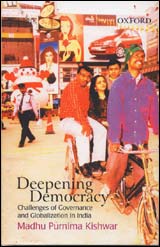 |
|
Deepening
Democracy
Challenges of Governance
and Globalization in India
(Oxford University Press)
MADHU PURNIMA KISHWAR, • Pages: 334
India: Rs 595 (Hardbound) Rs 295 ( Paperback)
US: $ 25 (Hardbound) $ 15 (Paperback) Price
inclusive of airmail postage.
This
volume brings together essays by noted scholar-activist
Madhu Purnima Kishwar on enduring issues
such as rights, governance, and the impact
of globalization on the average Indian citizen.
The volume covers a range of issues from
a glimpse of the License-Permit-Raid Raj
as it affects the livelihood of the self-employed
poor, to a critique of India's farm and
economic policies. It further discusses
the new divides being created by the country's
language policy to the causes and possible
remedies for ethnic conflicts in India.
While acknowledging that the current trade
regime is biased in favour of powerful industrialized
nations, Kishwar points to entrenched assumptions
and positions taken by those she calls the
Anti-Globalization Brigade who claim that
liberalization and globalization are intrinsically
anti-Third World and anti-poor. Written
in a lucid and engaging style, this book
will draw a wide readership among scholars
across disciplines, in addition to activists,
journalists, policy makers, bureaucrats,
and the lay reader..
More
»
|
|
| |
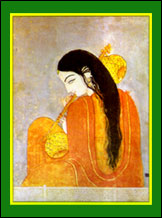 |
|
Women
Bhakta Poets
10th Anniversary special
volume Manushi Prakashan, 1989
Price: Rs.115 (India), US $ 10 (Overseas)
includes postage Hardbound
• Pages: 120 Contains
accounts of the life and poetry of some
of the most outstanding rebel women in Indian
history from the 6th to the 17th century
- Mirabai, Andal, Avvaiyar, Muktabai, Janabai,
Bahinabai, Lai Ded, Toral, Loyal. They have
left a powerful social and cultural legacy,
which constitutes a living tradition even
today. Their songs are not only an integral
part of popular culture in their regions,
but they are also remembered and revered
for having stood by their chosen ideals
in defiance of prevalent social norms. Many
of their poems have never been translated
into English before. |
|
Books |
| |
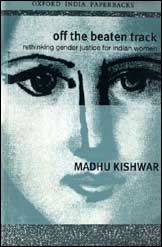 |
|
Off
the Beaten Track
Rethinking Gender Justice
for Indian Women
Madhu Kishwar, Oxford University Press,
September 1999
Price: Rs 295/- (India), US $ 15 (Overseas)
Pages: 290
(Including postage) ISBN 019 5648461
These
essays from MANUSHI challenge statist approaches
to Indian women's rights. They review various
laws ostensibly enacted to strengthen women's
rights; the reasons for the failure of anti-dowry
campaigns; why the culture of son preference
is spreading; the denial of inheritance
rights to women; how women relate to love,
sex and marriage; sexual harassment; the
problem of identities; the culture of beauty
contests, and certain cultural icons that
hold powerful sway among Indian women. This
thought-provoking collection attempts to
answer one of the most serious questions
facing the women's movement today - why
it is that, despite so much attention being
focused on women's rights, the contemporary
women's movement has failed to solve any
of the issues it took up over the last two
decades. |
|
| |
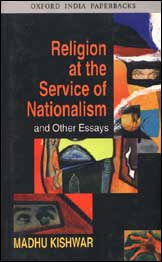 |
|
Religion
at the Service of Nationalism and Other
Essays
Madhu Kishwar, Oxford University Press,
1998
Price: Rs 295/- (India), US $ 15 (Overseas)
Pages: 323
(Including of airmail postage)
ISBN 0195641612
This
anthology of essays examines ethnic, religious
and politically inspired conflicts in India.
The first set of articles describes how
Hindu-Sikh relations became hostage to the
ongoing conflicts in Punjab over Centre-State
relations. Another set describes Hindu-Muslim
conflicts, including animosities that arose
during the personal law controversy, the
use of communal violence for electoral gains,
the bloodshed in the aftermath of the destruction
of Babri Masjid, and the transformation
of the Kashmiri movement for regional autonomy
into a murderous ethnic conflict between
Hindus and Muslims. The essays closely intermesh
reportage and political analysis with suggestions
for methods to combat the politics of ethnic
violence. Hard-hitting and provocative,
they are characterized by an urgency and
passion stemming from Madhu Kishwar's extensive
field and archival work. Essential reading
for all those concerned about finding solutions
to the growing ethnic conflicts in India. |
|
| |
 |
|
In
Search of Answers:
Indian Women’s Voices from Manushi
Edited by Madhu Kishwar & Ruth Vanita
Manohar Publisher, 3rd edition, 1996 Price:
Rs. 280(India), US $ 15 (Overseas) •
Pages: 249
This
book offers a selection of the most incisive
records, analysis, as well as testimonies
to have appeared in Manushi in its first
five years. Vividly portrayed are the living
and working conditions and the day-to-day
struggles of millions of ordinary Indian
women. The articles explore why, even four
decades after Independence, women remain
oppressed, and need to toil endlessly for
basic necessities - food, fuel and water.
This culture of women's subjugation is seen
not as a hangover from a traditional past,
but as rooted in modern economic and political
developments of the last two centuries. |
|
| |
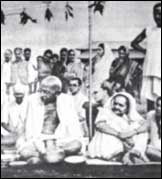 |
|
Gandhi
and Women
Madhu Kishwar, Manushi Prakashan, 1986 Price.
Rs. 50 (India), US$5 (Overseas) •
Pages: 56
An
essay on Mahatma Gandhi's lifelong involvement
with women's issues - the strategies and
methods he used for drawing women into the
freedom movement, and the role that women
played in evolving his philosophy of non-violent
satyagraha. The essay also explores how
while confronting the problem of mass mobilization,
Gandhi became aware of women not only in
terms of their problems but also as a powerful
potential force in society, hitherto overlooked
and suppressed. |
|
Booklets |
| |
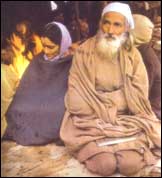 |
|

Two Voices from the Save Himalaya Campaign
Interview with Sunderlal and Vimla Bahuguna
(Hindi)
Madhu Kishwar, Manushi Prakashan, 1993
Price: Rs. 20 • Pages: 42
Sunderlal Bahuguna
and his wife, Vimla Bahuguna are among those
who founded the internationally renowned
Chipko Andolan to save the ecology of the
Himalayas with common people, especially
women, and took a leading role in attempts
to free the forests from the clutches of
a rapacious government. The booklet contains
a detailed interview of the Bahugunas by
Madhu Kishwar, covering various aspects
of their work, especially their struggle
against the building of the Tehri Dam.
|
|
| |
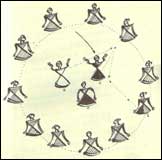 |
|

Roshni: A street play (Hindi)
Manushi Prakashan, 1987
Price: Rs. 20 (India), US $2 (Overseas)
• Pages: 24
Faizal Alkazi
helped the MANUSHI group to develop this
street play in a theatre workshop in 1986.
Ruth Vanita wrote the script based on the
tape-recorded improvisations. Madhu Kishwar
wrote the songs.
The play has been performed by the MANUSHI
group in colonies, streets, parks, markets,
schools and colleges. The play delineates
the growth of a young girl and her learning
to challenge the discriminatory treatment
meted out to girls in many families.
|
|
Audio Visual Materials |
| |
Six
Films by Madhu Kishwar, 1997 (Hindi)
(Not available in English version)
Special discount offer for Manushi Subscribers
CD – Rs.150.00 Plus Postage Charges

Dowry: Compulsion vs Need? (30 min.)
In India, the common perception
is that dowry is a social evil. For women in
particular, it is considered to be a curse.
On one hand, it has been demanded repeatedly
that the government should pass stricter laws
to abolish the custom of dowry. But those very
people who make such demands are unable to answer
why the anti-dowry law that was enacted in 1961,
and made even more stringent in 1984 and 1986,
has remained unsuccessful. Why is it that even
after so many decades of pronouncing dowry illegal,
the culture of dowry has become stronger and
more widespread? Why is it that even those who
condemn it are not able to withstand the growing
power of this custom in their own families?
Is it a disease that has gripped people against
their wish? Or does the problem lie elsewhere?
These are some of the questions answered in
this programme.

The Disinheritance of Women (30 min.)
In most parts of our country
and among most communities, the belief that
the rightful heirs to the family property are
sons, is getting stronger. Parents might spend
lakhs in buying consumer goods for their daughters
as dowry, but very few are willing to give a
share of the parental property to daughters.
This documentary explores the implications of
the growing culture of disinheritance of women
in our country.

Liquor and State Policy (30 min.)
This film challenges some of the popular myths
about anti-liquor movements in India, for example
the belief that these are primarily led by women
against men. The film reviews the dynamics of
anti-liquor movements in four different states:
Punjab, Haryana, Maharashtra and Andhra Pradesh
and examines the key role played by men in initiating
protests and struggles to rid their villages
of the liquor menace. It also tries to explain
why most anti-liquor movements start off by
targeting drunkards but soon turn anti-government.
The film examines the role and response of the
state machinery with regard to spreading liquor
consumption.

License
Permit Raj: A View from Below (30 min.)
The consequences
of the "liberalisation" of our economy
are clearly evident in every city and even some
villages. New models of TV, refrigerators, music
systems, household gadgets and even clothes and
shoes of international brands are invading the
market every day. Cars of foreign models based
on latest technology are running on our roads.
But, on the other hand, vegetable-carts and cycle-rickshaws,
which are a means of livelihood for millions and
a cheap form of transport for common people, have
not seen any technical improvement. On the contrary,
their technology seems to have deteriorated further.
This film
explores how the working of the License-Permit-Raid-Raj
thwarts the earning ability and efforts of the
poor city migrants to move out of the poverty
trap. It provides moving glimpses as to how the
poorest of the poor are fleeced of their earning
by our babudom and the urgent need to evolve a
bottoms-up approach to economic reforms.

Agriculture and Sarkari Controls (30 min.)
One of the
major characteristics of developed countries is
that only 2 to 10 per cent of the population is
involved in agriculture. They not only feed their
own people but are also in a position to export
their agricultural surplus to the rest of the
world. However in India, 70 per cent of the population
is dependent on agriculture even today, and most
of them are so poor that they are unable to provide
adequately even for their own families.
Even after
50 years of independence, planned economy and
various other kinds of government controls have
remained unsuccessful in removing India's poverty.
On the other hand the hiatus between rural and
urban standards of living and income has widened
further. In 1951, if a villager was earning Rs.
I, his city-dweller counterpart was earning Rs.
1.40. Today, a city-dweller's income is on an
average about 10 times more than the villager's
income. Why is this gap increasing between rural
and urban areas? This film provides an insight
into the crippling restrictions imposed by the
state on agriculture and how these have kept farmers
mired in poverty.

India's
Traditional Technologists (30 min.)
Today India
is considered a poor agricultural country. But
until about 200 years back, our country was regarded
as the world's leading manufacturing society.
Europeans took hazardous voyages to India, attracted
by its wealth and exquisite luxury goods. One
of the major characteristics of our traditional
technological excellence was that it did not merely
cater to the aristocratic urban elite. High quality,
aesthetically designed consumer goods and architectural
wonders were found in virtually each part of the
country. This is the reason why old jewellery
of our ordinary village women, old brass and copper
pots commonly used in rural homes, their carved
doors, windows and household furniture are today
sold as exorbitantly priced antique items in the
international market.
This technological
legacy was the inheritance of a group of jatis
known as 'Vishwakarma', who are found in every
Indian city and village.
Tragically
enough, the jatis who elevated our country's technological,
craft and industrial skills to such astonishing
levels over centuries have today been declared
as "Backward" and "Most Backward
Castes". Why and how have their skills and
art become obsolete? What impact has their devaluation
had on the rest of society? These are some of
the questions explored in this documentary. |
Audio Cassette |
| |
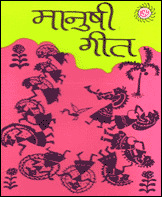 |
|

Manushi Geet
Price : Rs 50 (India),
US$ 5 (Overseas)
(including airmail postage)
Duration : 60 minutes
An audio cassette
of songs and poems. Songs in Hindi by
Madhu Kishwar, set to lively popular tunes
plus a selection of Hindi poems by women,
from MANUSHI back issues.
|
|
| |
|
CARDS AND T-SHIRTS
 |
|
Manushi
Cartoon Cards
Set of 8 cards
Price: Rs 50 (India), US $ 5 (Overseas)
(including airmail postage)
Some of MANUSHI's most punchy cartoons are
now
available on Greeting Cards |
 |
|
Aung
San Suu Kyi postcard
In support of the pro-democracy
movement in Burma
Set of 10 cards
Price: Rs 50 (India), US $ 5 (Overseas)
(including airmail postage) |
 |
|
T-Shirts
For A Nuclear Free World
Price: Rs 150 each
(India)
US $10 (Overseas)
(including airmail postage)
Sizes: S,M,L, XL |
|
| |
|
|
|

